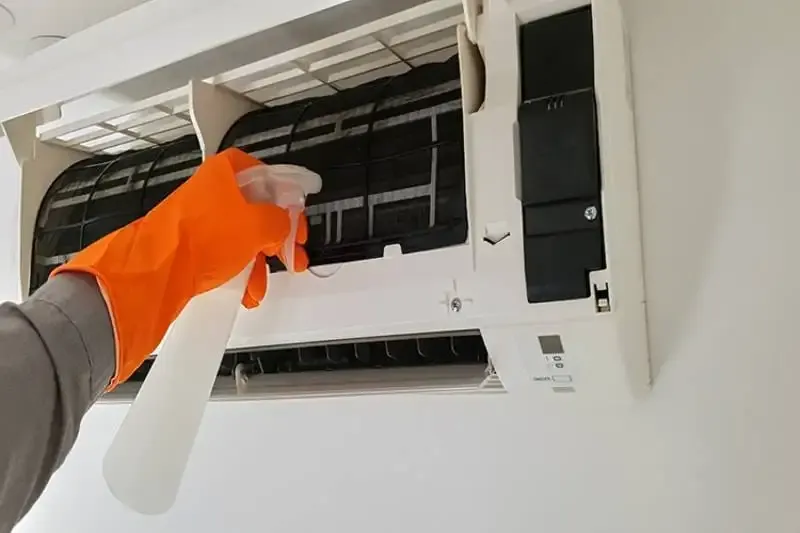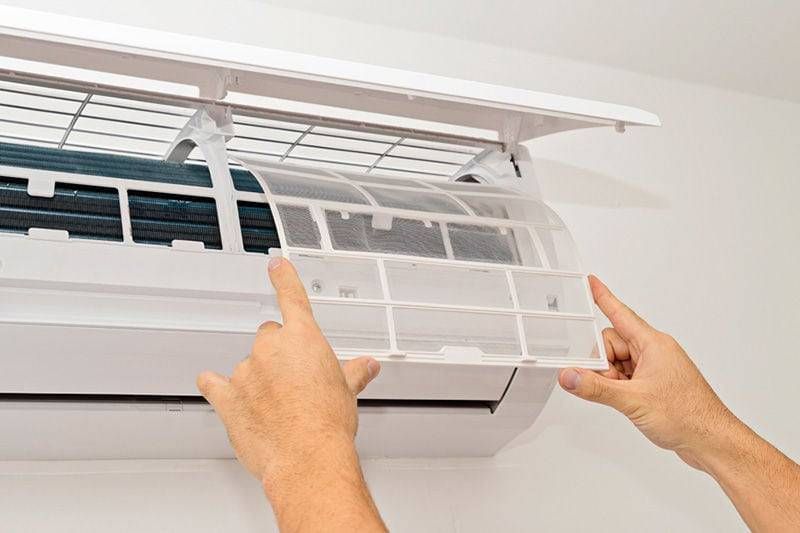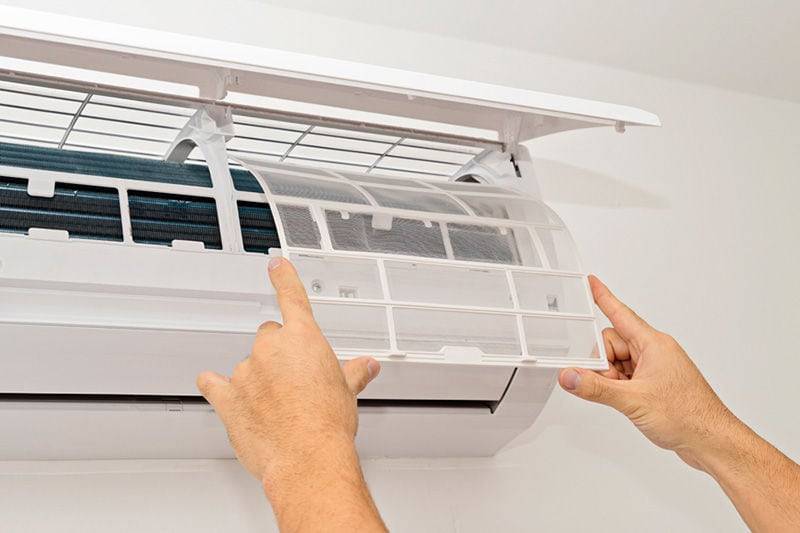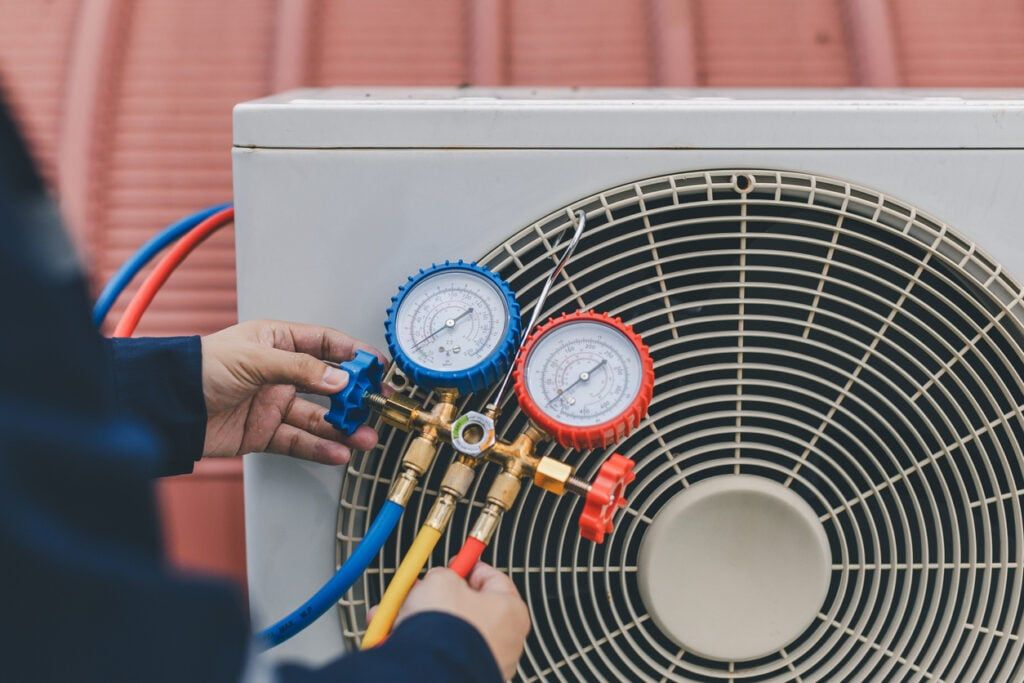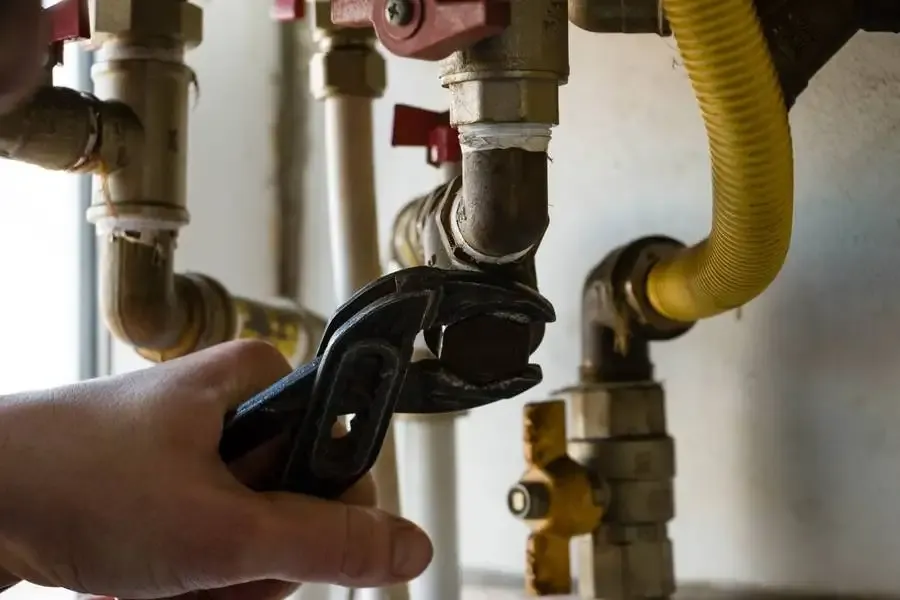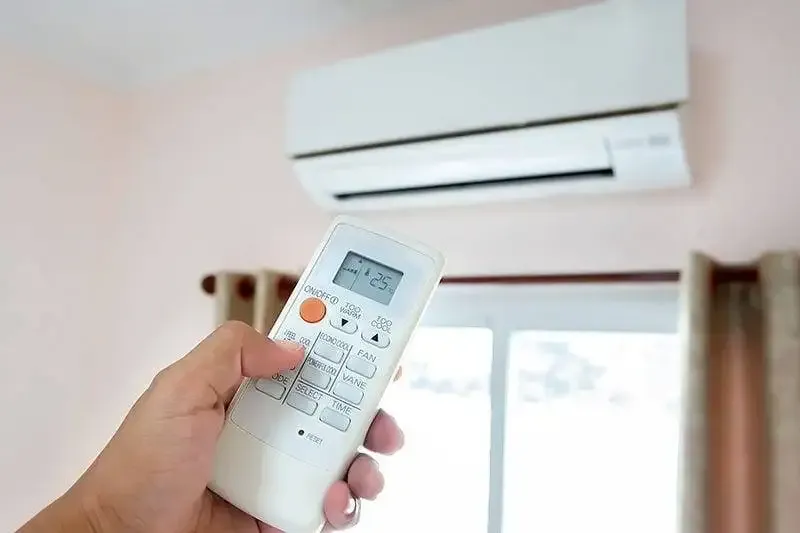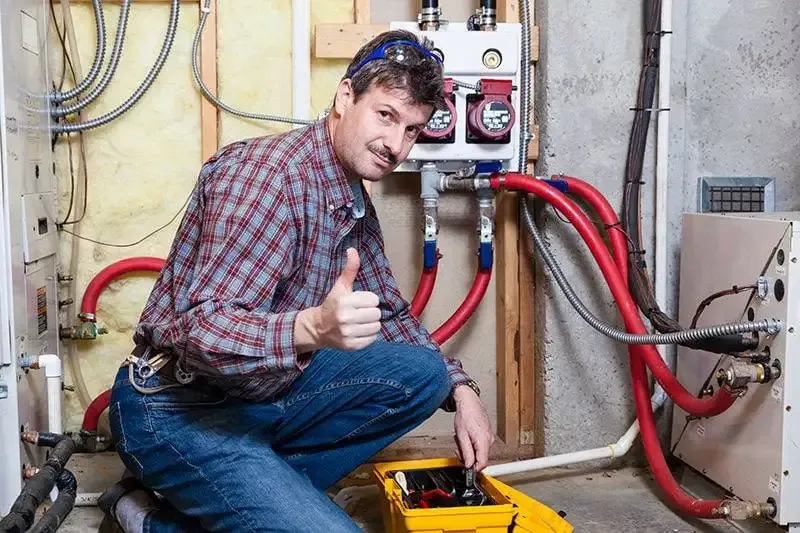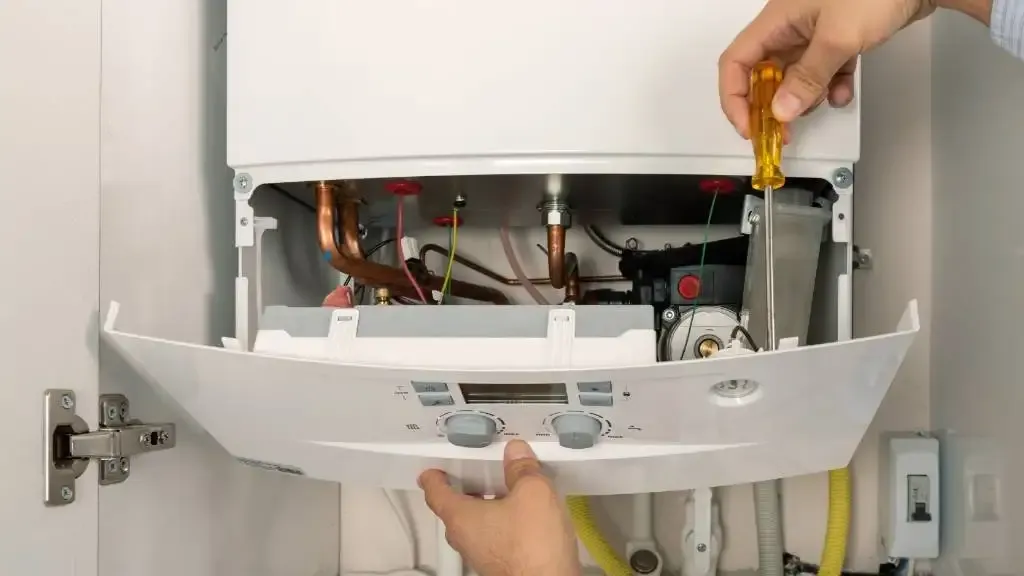As wintertime rolls around, it’s time to start preparing your heating, ventilation, and air conditioning (HVAC) system for the changing weather. Your air conditioner won’t be used for an extended period of time, so you need to clean, cover, and repair it during the winter. The right winter air conditioner preparation can prevent mold growth and unexpected repairs.
With the help of Balance Point Heating, Cooling & Plumbing, you can get a maintenance inspection for your HVAC system. Our team can help you winterize AC units in Fort Collins and prepare your heating system for colder weather. Read on for more information on how to winterize air conditioner units.
Winterizing Your Air Conditioner: A Complete Guide for Fort Collins Homeowners
Before cold weather arrives, take some time to clean your air conditioner, change the thermostat, and replace your filters. With a few simple steps, you can reduce the impact of Colorado’s cold, arid climate on your AC. A well-maintained AC can last for 15 to 20 years, so the right maintenance tasks can save you money on AC replacements and repairs in the long run.
Why Winterizing Your AC Is Essential in Fort Collins
When it comes to your Fort Collins winter AC checkup, it pays to be diligent. Average lows can reach 20°F, so you need to take a few extra precautions to keep your AC safe from colder temperatures and snowy weather. If you aren’t careful, your AC may develop some of the following issues.
- Mildew and mold growth
- Damaged components
- Debris accumulation
- Nesting by rodents, insects, and pests
Besides damaging the components, cold, wet weather can cause moisture to build up inside your air conditioner. Eventually, this can lead to the development of mold, mildew, and rust. Over time, these issues can end up causing added repair costs. Your loved ones can even suffer from respiratory illnesses and allergy flare-ups because of the resulting air quality.
Thankfully, AC winterization in Fort Collins helps you prevent major damage to your air conditioning unit. During our maintenance inspection, we’ll discuss how to winterize air conditioner units, the best cover options, and any necessary repairs.
Top Steps To Winterize Your Air Conditioner in Fort Collins
In Fort Collins, you can typically expect around 48 inches of snowfall each winter. While this is less than in some parts of the United States, this is still a fairly significant amount of snow. If your air conditioner isn’t properly protected, it can become damaged. With a few steps to winterize AC units in Fort Collins, you can protect your AC from breakdowns, save money on repairs, and ensure your AC is ready when summer rolls around next year.
Step 1: Clean and Clear the Area Around Your AC
To get started on your seasonal AC maintenance, clean the outside of the unit. Remove any bugs, dirt, or debris that you see.
After cleaning off the area, spend some time weeding and cleaning around the unit. Any debris or plant matter can get into the AC and cause it to malfunction. As a part of the winter preparation, you should clear away 2 to 3 feet of space around the unit.
Step 2: Protect Your Unit With the Right Cover
When local residents ask about how to winterize air conditioner units, we typically recommend getting a cover for the unit. This cover keeps dust, leaves, debris, and other items out of the air conditioner. It also prevents animals and insects from nesting inside.
Additionally, a cover keeps water and snow from getting into the unit. Moisture can cause mold, mildew, and rust, which is why it’s so important to cover up the air conditioner before cold weather sets in. The cover should be fastened at the bottom so that it doesn’t blow away, but there should still be enough space for moisture to get out.
Step 3: Adjust and Test Your Thermostat for Winter
Your thermostat is an integral part of your HVAC system. One of the best AC winter care tips is to simply check your thermostat. Before the weather cools off, you need to switch your thermostat from AC mode to heating mode.
To improve your home’s energy efficiency, try getting a smart thermostat installed. On average, a smart thermostat saves homeowners 8% of their heating and cooling bills each year.
You can also reduce your energy costs by gradually lowering the temperature as you acclimate to colder weather. For example, you may start with the temperature at 74°F. After a week, you can lower it to 72°F. Then, you can wait another week before lowering the temperature again. To maximize your comfort and energy efficiency, the Department of Energy generally recommends setting your indoor temperature at 68°F to 70°F.
Step 4: Complete Any Necessary Repairs Before Winter
If you’ve been delaying repairs because you want to keep using your AC, it’s time to schedule your next inspection. At Balance Point Heating, Cooling & Plumbing, we recommend scheduling two maintenance inspections a year. You should get your heating inspection completed before winter sets in.
During your fall maintenance check, you can bring up any problems you’ve been having with your AC. For example, unusual sounds and smells indicate a problem. From time to time, you should also get the ducts inspected so that any cracks can be properly sealed up.
Step 5: Insulate Your AC Pipes Against Freezing
During the best AC maintenance in Fort Collins, you can get help with insulating your AC. Normally, a foam pipe cover is placed around the tubing, which protects the copper tubing. To ensure this cover doesn’t come off, use zip ties to attach it.
Step 6: Replace Air Filters for Improved Efficiency
Air filters are an important component in your HVAC system. They filter out dust, dirt, and pollution so that these elements don’t get into the rest of your unit. If the air filter isn’t changed in a timely manner, it can cause your evaporator coil to become dirty. Your AC is also more likely to freeze.
When you winterize AC units in Fort Collins, start by changing or cleaning the air filter. Most manufacturers recommend that this activity should be performed every 30 to 90 days. Switching out a clogged filter can improve your HVAC system’s efficiency by up to 5% – 15%.
Step 7: Schedule a Winterization Maintenance Inspection
One of the most important AC winter care tips is to schedule a maintenance inspection. A maintenance inspection ensures your AC is fully cleaned, repaired, lubricated, and ready for wintertime. During a routine maintenance inspection, we will perform the following activities.
- Check and clean refrigerant lines, blower, fuses, drain, and connections.
- Lubricate moving parts.
- Recommend any necessary repairs.
- Perform any necessary adjustments.
By performing some simple maintenance tasks before winter sets in, you can ensure your air conditioner will be ready to use by springtime. To make maintenance a little more convenient, we offer a maintenance plan and flexible scheduling for Fort Collins residents.
Choosing a Maintenance Plan for Fort Collins’ Cold Season
With winter just around the corner, it’s crucial to ensure your heating system is ready to handle the colder temperatures ahead. At Balance Point Heating, Cooling, & Plumbing, we can determine the best AC maintenance plan for your needs. Seasonal maintenance in the fall is especially important to prepare your heater for the demanding winter months while also wrapping up any lingering AC issues before they are forgotten until next summer.
For those with older HVAC units, fall maintenance is even more critical. Aging systems tend to require more frequent inspections to prevent unexpected breakdowns during peak winter usage. Likewise, if you’ve experienced recurring issues with your AC throughout the summer, now is the perfect time to address them and ensure your overall system operates seamlessly when you need it most.
By scheduling a Fort Collins winter AC checkup, you can spot repair issues before they spiral out of control. To make maintenance inspections more convenient and affordable, we offer a whole home comfort plan. When you sign up for your membership plan, you can enjoy a number of important benefits.
- No breakdown guarantee
- Prioritized services
- One-year warranty on all of our work
- Spring AC maintenance
- Fall heating maintenance
- 10% discount on all of your repair needs
- 24-hour emergency services
- Friends & Family Member Benefits
- Humidifier services
- Exclusive promotions throughout the year
How Does Fort Collins’ Winter Impact Your AC’s Maintenance Needs?
In Fort Collins, December is typically the coldest month of the year. During this month, you can generally expect an average low of 20°F and a high of 41°F.
Prevent Snow Damage
While Fort Collins is often dry, it does receive a significant amount of snowfall. Investing in the right AC cover will help you prevent snow from getting into your unit and causing damage.
Avoid Wind Damage
Fort Collins is also known for its Chinook winds. This type of wind is warm and dry. Once the Chinook winds arrive, they can melt snow quickly. The resulting moisture can cause as much damage to your AC as the wind itself.
To protect your air conditioner, you will need to use a cover. This can prevent the Chinook winds from blowing dust, dirt, and leaves into your AC. If this debris is allowed into your AC, it’ll hold moisture and cause your components to rust. Over time, plant matter and debris can also cause mold to develop.
Chinook winds can harm your AC in other ways as well. They can gradually loosen components. If these components aren’t tightened, it can cause added wear and tear.
Why You Should Sign Up for an AC Maintenance Plan
If you’re looking for Fort Collins air conditioner maintenance tips, you should start by finding the right maintenance plan. The majority of repairs can be prevented by getting routine maintenance. Besides saving you a significant amount of money, routine maintenance can prevent breakdowns and increase the longevity of your AC.
Avoid Repairs and Breakdowns
By investing in air conditioner winter preparation, you can avoid costly repairs and breakdowns in the future. For example, not changing your air filter can eventually cause your evaporator coil to freeze up. Similarly, leaky ducts make your AC work harder, leading to additional wear. Rather than dealing with a costly, unexpected repair on a sweltering summertime day, you can devote a little extra time to maintaining and winterizing your AC in the present.
Enjoy a Heightened Level of Convenience
By signing up for a maintenance plan, you can get rid of all the stress and planning involved in AC maintenance. Instead, we’ll handle all of the work for you. We’ll notify you when it’s time to have a maintenance check. Then, we’ll give you a reminder before the day arrives.
Boost the AC’s Longevity
On average, air conditioners have to be replaced every 10 to 20 years. However, the only way to reach this maximum lifespan is by caring for your AC. When you take care of your AC, you can delay getting an AC replacement and save money.
Increase Your Performance
Many maintenance issues force your AC to work harder and lead to added wear. When your AC has an easier time cooling your home, you can enjoy having even temperatures in each room and a more comfortable environment.
Enhance Your Energy Efficiency
By achieving better AC performance, you can also enjoy a higher level of energy efficiency, setting the stage for future performance in spring and summer. For instance, changing a clogged air filter can boost your energy efficiency by 5% to 15%. Since home heating and cooling make up around 42% of the average power bill, these savings can quickly add up.
Why You Should Hire a Certified Technician for AC Service
If you’re ready to winterize AC units in Fort Collins, start by reaching out to a professional technician. Certified technicians have extensive experience with a lot of brands and HVAC units. More importantly, they understand what Fort Collins’ climate is like, so they know the best techniques for AC winterization in Fort Collins.
By reaching out to a certified HVAC technician, you can enjoy the following benefits.
- Expertise: A certified technician knows all of the best AC winter care tips. They can easily diagnose complex problems. Our expert technicians can help you prevent breakdowns and enjoy a more comfortable home.
- Warranty Protection: Typically, an HVAC warranty will require you to use a professional technician. Otherwise, you’ll void the warranty. Plus, our HVAC company guarantees our own work and materials as well.
- Peace of Mind: Because we offer a warranty for our services and provide an exceptional level of craftsmanship, you can enjoy better peace of mind. Once the weather warms up, you won’t have to worry about shoddy services leading to expensive AC repairs.
- Speed: When you need to winterize your air conditioner unit, you don’t want to waste time waiting for an HVAC technician to show up. By working with our team, you can be confident that your maintenance services and repairs will be completed as quickly and efficiently as possible.
- Craftsmanship: Our certified technicians stand behind the quality of our work, so you can be confident that your repairs will last.
- State-of-the-Art Equipment and Technology: By partnering with certified technicians, you can get the best technology and equipment.
- Reliability: Our team is known for its professionalism. When the day of your maintenance appointment arrives, our HVAC technicians will be right on time. From reliable components to punctual technicians, we offer the highest level of services possible.
A typical AC can cost thousands of dollars to repair or replace. Rather than spending your hard-earned money on repairs, you can prevent breakdowns by getting routine maintenance checks. Your air conditioner winter preparation, filter changes, and other maintenance tasks can also help to protect your AC from wear, dust accumulation, and the elements.
What To Do When Your Air Conditioner Breaks Down
Even if you carefully follow all of the best Fort Collins air conditioner maintenance tips, your air conditioner may still break down from time to time. Fortunately, there are a few things you can do to troubleshoot the issue. If these easy maintenance tips don’t help, you’ll need to reach out to an HVAC professional for more help.
Inspect Your Thermostat
Sometimes, the AC issue is as simple as the setting on your thermostat. If someone turns your thermostat off, your HVAC system won’t produce any hot or cold air. Before you call for repairs, make sure the thermostat’s mode is correct. Then, check the temperature setting.
Replace Your Filter
A dirty air filter can cause your AC to freeze up. It also weakens the performance by blocking airflow. Air filters should generally be changed every 30 to 90 days, depending on the manufacturer’s specifications. If you don’t remember when you changed your air filter last, it’s time to get it replaced.
Look at Your Breaker Panel
Occasionally, a breaker switch can get tripped if there is an electrical surge or faulty component. When this happens, you can simply flip the switch in the breaker panel. If your AC starts working again, you’ve solved the problem.
However, you should call for professional repairs if the breaker trips again. This can mean that there is a major issue with your electrical system, so you should turn your AC off and schedule an HVAC inspection.
Call for Help
While there are minor tasks you can do on your own, some problems are too complicated or hazardous to handle by yourself. If your AC isn’t working properly, Balance Point Heating, Cooling & Plumbing can help. You may need professional help if you’ve noticed any of the following symptoms.
- Unusual smells
- Lack of cold air
- Weird sounds
- Short cycling
With the help of a professional, you can quickly determine the underlying cause of your AC issues. Then, we can perform a Fort Collins winter AC checkup. With a few simple steps, you can repair your AC and ensure it lasts as long as possible.
What Does Our Air Conditioner Maintenance Include?
With the right maintenance services, you can get help with AC winterization in Fort Collins. Our team will also perform the following tasks to protect, repair, and maintain your AC.
- Clean Condenser Coils: We’ll clean the condenser coils so that they can function efficiently.
- Adjust the Thermostat: Then, we’ll adjust your thermostat and make sure it is accurately tracking the temperature.
- Change Air Filters: We’ll make sure your AC filter has been changed recently.
- Charge Refrigerant: Refrigerant can only be handled by a certified technician. During our maintenance inspection, we’ll ensure your refrigerant levels are where they should be.
- Lubricate Moving Components: To prevent friction and unnecessary wear, we’ll lubricate moving components in your AC.
- Tighten Connections: Then, we’ll tighten any electrical connections that have gradually loosened since our last HVAC inspection.
- Inspect the Air Handler: Our technician will inspect the air handler, condenser unit, and other components to ensure they’re working correctly.
- Test Your HVAC System: Finally, we will test your HVAC unit to make sure all of our maintenance tasks are effective.
By working with our professional HVAC technicians, you can enjoy the highest quality of repairs and maintenance work possible. Through our Fort Collins air conditioner maintenance tips, you can avoid AC damage during the winter and enjoy having better AC performance throughout the year.
Get Expert Help Winterizing Your AC in Fort Collins and Surrounding Areas
Learning how to winterize air conditioner units is important if you want to have a comfortable home next summer. During your air conditioner winter preparation, spend some time cleaning your outdoor unit and clearing debris from the area around it. Then, replace your air filter and check the thermostat. To protect your AC from the elements, use a cover.
If you notice any repair issues, our team can help. Our technicians can winterize AC units in Fort Collins and let you know if there are any faulty components. Then, we can quickly carry out the necessary repairs before you turn your AC off for the season.
Learn more about Balance Point’s range of services by filling out our online form or giving us a call today.

